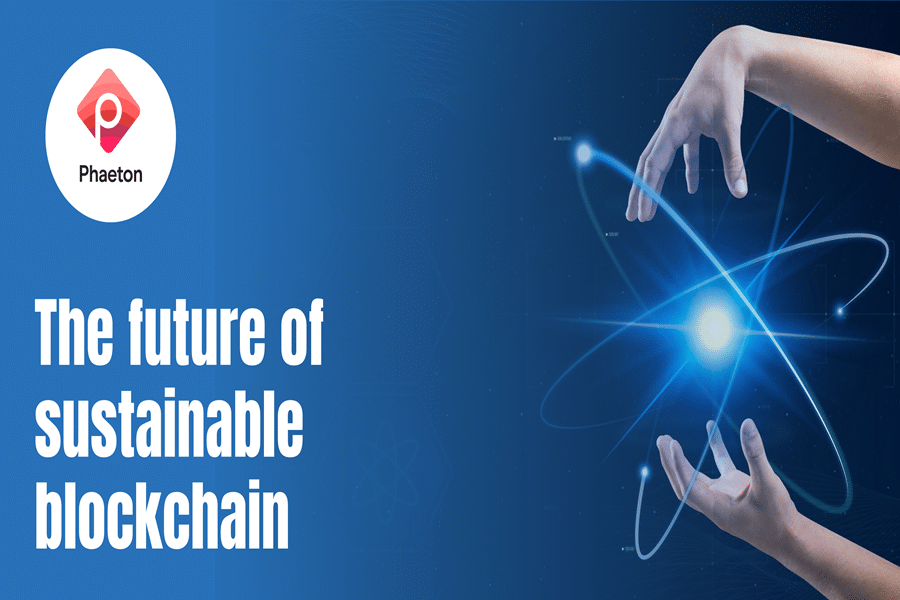We are living in a time of significant change. Our society is transitioning from an industrial economy to a new set of technologies.
Blockchain, a relatively young technology, is being used to develop new business models and disrupt existing ones.
Blockchain is a technology that allows people to create decentralised applications that require lots of computing power. It uses a proof-of-work system to ensure value in the currency used inside the Blockchain based applications. It works on the basis that because everyone who downloads the software has to run a program to solve complex math problems, which need to be solved. This creates the requirement for a lot of computing power for the whole network.
There are only a few sustainable blockchain projects that address this problem.
One of the leaders is Phaeton.
Phaeton is making headlines for its efforts to make renewable energy based Blockchain services available to everyone.
Blockchains and Energy Consumption
Bitcoin transactions consume 1,173 kWh (kilowatt-hour) of electricity, equivalent to the amount needed to power the typical American household for six weeks.
The miners who enable transactions consume 176 dollars worth of electricity, costing the average user 0.0022 bitcoins, or about $176.Bitcoin requires 152 TWh per year, or 0.65% of the world’s total power usage.
Bitcoin on its own is a decentralised digital currency, however it uses as much electricity as the whole country of Poland.
Ethereum is a blockchain that uses Proof of Work. 1 Ethereum transaction takes up 238.2 kWh of electricity. It consumes about 75 Terawatt hours per year, which can power many small countries for a year.
Such a huge waste of energy is not sustainable.
Hence, Phaeton’s low energy-based, carbon neutral model.
The blockchain industry is increasingly looking for methods to promote global sustainability. When information is stored on a blockchain, it is done so on a ‘trust less’ manner. Information stored becomes irreversible and viable, ensuring that parties are held responsible for their green commitments.
Private blockchains are the most energy-efficient option available today. This has paved the path for change throughout the ecosystem since it is no longer possible to explain that high energy usage is the only way to operate a blockchain.
Phaeton and Sustainable Energy
Phaeton is making significant advances in sustainable and green technology.
Data centres, solar power, real estate, and other projects are among those they are working on.
Phaeton is creating a global decentralised platform. Phae, their native coin, is supported by assets. By deploying Phaeton modules and Artemis nodes in various areas, Phaeton intends to be the most decentralised global blockchain network.
Phaeton Blockchain activities are powered by renewable energy sources such as solar, thermal, or hydrogen energy, which reduces greenhouse gas emissions. Phaeton’s investments objectives are that all corporate activities are financially viable now, in the near and distant future, benefiting its owners and coin holders.
Phaeton projects focus on renewable energy and environmental conservation. Their main goal is to make sure that the environment is protected by investing in companies that specialize in these areas.
Phaeton blockchain data centres use renewable energy.
They are owned and operated by the Phaeton Blockchain platform.
Phaeton Energy specializes in renewable energy products. Their products include micro-grid solar farms, vanadium batteries, geothermal, wind, and hydrogen.
Phaeton DeFi , a decentralized finance and exchange is a decentralized platform that allows users to trade carbon credits and real estate tokens.
Phaeton also creates bonds that fund renewable energy projects.
Every blockchain application and investment in Phaeton’s ecosystem serves a positive purpose.
Phaeton’s NFT marketplace is more than just some other platform for issuing new NFTs, of which there are hundreds.
In contrast, the NFT concept is used in a Carbon Credit Exchange.
Sustainable Projects Are The Future
Sustainable projects like Phaeton’s are the future. Although their main focus is on having a positive social impact, blockchain ensures greater transparency and a better life for everyone involved. Their native token Phae has had an excellent initial exchange offering (IEO) and is currently listed on many mainstream exchanges.
Phaeton allows for easy customization, scalability, security, and convenience. Sidechains allow for independent applications to be built on top of the blockchain without having to pay large transaction fees.
